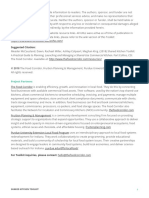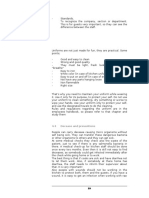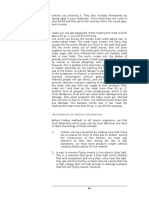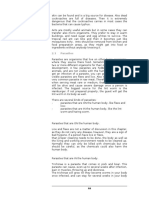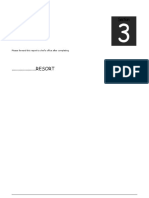0 ratings0% found this document useful (0 votes)
14 viewsStew Borwn
Stew Borwn
Uploaded by
mohamed.mauroofThe document discusses different types of bacteria including spore forming bacteria, bacteria that produce toxin waste, and useful bacteria. Spore forming bacteria can form spores that allow them to resist heat, cold, chemicals and dry conditions. Bacteria that produce toxin waste can create dangerous toxins during multiplication that cannot be destroyed by cooking and can cause food poisoning. Some bacteria are useful, for example in producing cheese, yogurt and breaking down waste.
Copyright:
© All Rights Reserved
Available Formats
Download as PDF, TXT or read online from Scribd
Stew Borwn
Stew Borwn
Uploaded by
mohamed.mauroof0 ratings0% found this document useful (0 votes)
14 views1 pageThe document discusses different types of bacteria including spore forming bacteria, bacteria that produce toxin waste, and useful bacteria. Spore forming bacteria can form spores that allow them to resist heat, cold, chemicals and dry conditions. Bacteria that produce toxin waste can create dangerous toxins during multiplication that cannot be destroyed by cooking and can cause food poisoning. Some bacteria are useful, for example in producing cheese, yogurt and breaking down waste.
Original Title
stew borwn
Copyright
© © All Rights Reserved
Available Formats
PDF, TXT or read online from Scribd
Share this document
Did you find this document useful?
Is this content inappropriate?
The document discusses different types of bacteria including spore forming bacteria, bacteria that produce toxin waste, and useful bacteria. Spore forming bacteria can form spores that allow them to resist heat, cold, chemicals and dry conditions. Bacteria that produce toxin waste can create dangerous toxins during multiplication that cannot be destroyed by cooking and can cause food poisoning. Some bacteria are useful, for example in producing cheese, yogurt and breaking down waste.
Copyright:
© All Rights Reserved
Available Formats
Download as PDF, TXT or read online from Scribd
Download as pdf or txt
0 ratings0% found this document useful (0 votes)
14 views1 pageStew Borwn
Stew Borwn
Uploaded by
mohamed.mauroofThe document discusses different types of bacteria including spore forming bacteria, bacteria that produce toxin waste, and useful bacteria. Spore forming bacteria can form spores that allow them to resist heat, cold, chemicals and dry conditions. Bacteria that produce toxin waste can create dangerous toxins during multiplication that cannot be destroyed by cooking and can cause food poisoning. Some bacteria are useful, for example in producing cheese, yogurt and breaking down waste.
Copyright:
© All Rights Reserved
Available Formats
Download as PDF, TXT or read online from Scribd
Download as pdf or txt
You are on page 1of 1
can cause sickness.
These bacteria cause in almost every
case severe food poisoning or infection in the human body
(can be internal as well as external). In some cases people
can die from this. Bacteria can very easily multiply
themselves and also very fast.
Bacteria can be divided into several groups;
- spore forming bacteria
- non-spore forming bacteria
- bacteria that does not produce any toxin waste
- bacteria that does produce toxin waste
- useful bacteria
- bacteria that causes food spoilage
- bacteria that causes sickness or illness
Spore forming bacteria
Certain bacteria form in bad environmental conditions
spores, that is like a camouflage of the bacteria. It protects
itself against dying. It transforms its “body” into a endospore
and in that way they can resist heat, cold, sour or sweet.
Even against chemicals and dry environments. These group
of bacteria are the most dangerous to humans, as we cannot
kill them. Once they are in spore form, they do not multiply,
but once the conditions becomes better, they transform
again from the spore into the bacteria and continue their
damage. So, sometimes by cleaning with heavy chemicals,
or by heating food up to even more than 100 gr. C, or by
freezing food below 20 gr. C, we still cannot kill them.
Bacteria that produces toxin waste
Some bacteria produce during multiplying themselves a
dangerous toxin (poison). This toxin is also in the food where
the bacteria is. The toxin cannot be destroyed by any
cooking method. The toxin is in most cases very neutral in
flavor and cannot be found without a microscope. The
damage that the toxin can cause, is food poisoning in
general, illness and in the worst case even death if not taken
the proper care.
Useful bacteria
Bacteria can be very useful to us. Some examples are
cheese, yogurt and sour kraut. Also the bacteria that are in
the water under the ground are very useful in breaking down
certain types of waste. They breakdown dead animals, plants
and clean the water that humans uses to swim. However, if
the water is seriously polluted, than the bacteria will die as
well, and the cleaning of the water cannot continue by the
bacteria, which causes the dangerous “botulism”. But, even
the work of these bacteria is very useful to us, we still cannot
19
You might also like
- Microbes in Daily LifeDocument36 pagesMicrobes in Daily LifeSusheel Gupta71% (7)
- Bacteria That Causes Food SpoilageDocument1 pageBacteria That Causes Food Spoilagemohamed.mauroofNo ratings yet
- The Good Bacteria: GI Jake - A Bifidobacterium!Document7 pagesThe Good Bacteria: GI Jake - A Bifidobacterium!Nurhanis Raof AnsarullahNo ratings yet
- What Are Bacteria?Document5 pagesWhat Are Bacteria?Carmen Julia VallesNo ratings yet
- Types of BacteriaDocument4 pagesTypes of BacteriaNadeem GunnooNo ratings yet
- Food SpoilageDocument11 pagesFood Spoilagedinakempho3No ratings yet
- C. Decease Causing Micro OrganismsDocument1 pageC. Decease Causing Micro Organismsmohamed.mauroofNo ratings yet
- English B - Blog DraftDocument2 pagesEnglish B - Blog DraftRICHARD ANDRES QUILLE MOROCHONo ratings yet
- Microbes NotesDocument22 pagesMicrobes Notesapi-218511741100% (1)
- BacteriaDocument2 pagesBacteriaapi-298865320No ratings yet
- 2Document15 pages2Ayush SagarNo ratings yet
- Hygiene and Food HandlingDocument36 pagesHygiene and Food HandlingLilian Villanova VogtNo ratings yet
- Microorganisms ReadingDocument3 pagesMicroorganisms Readingapi-548153301No ratings yet
- MicroorganismsDocument2 pagesMicroorganismsVan ChimexNo ratings yet
- Grade 8 CBSE (Biology) : Paste This Paper in Your Biology Note Book and Learn Them Thoroughly. Test On 20 Octt)Document2 pagesGrade 8 CBSE (Biology) : Paste This Paper in Your Biology Note Book and Learn Them Thoroughly. Test On 20 Octt)Khaled Turk0% (1)
- Useful Microbes - Microbes in Human WelfareDocument8 pagesUseful Microbes - Microbes in Human WelfareSanjaya SahooNo ratings yet
- Micro OrganismDocument6 pagesMicro OrganismmaanyaNo ratings yet
- All ModulesDocument112 pagesAll ModulesPardeep SinghNo ratings yet
- The Different Types of Include: Bacteria, Viruses, Fungi, Parasites and ProtozoaDocument13 pagesThe Different Types of Include: Bacteria, Viruses, Fungi, Parasites and ProtozoaPardeep SinghNo ratings yet
- BacteriaDocument3 pagesBacteriavineetakandeNo ratings yet
- Harmful and Beneficial Microorganisms: Read The "Microlife" BooksDocument17 pagesHarmful and Beneficial Microorganisms: Read The "Microlife" Bookskapil sharmaNo ratings yet
- Microorganisms Friend and FoeDocument27 pagesMicroorganisms Friend and Foedotcomddn100% (1)
- Food ContaminationDocument8 pagesFood ContaminationMabookgm MaNo ratings yet
- Archaea Domain: Kingdom ArchaebacteriaDocument2 pagesArchaea Domain: Kingdom ArchaebacteriaNouiea Bernardelle AcabalNo ratings yet
- Year 10 Bio 10Document16 pagesYear 10 Bio 10steven191073No ratings yet
- CH 2 Microorganism Friend and FoeDocument23 pagesCH 2 Microorganism Friend and FoeVidya MahajanNo ratings yet
- C7 Mic254Document33 pagesC7 Mic254Aqilah NajwaNo ratings yet
- Microbiology of Food... NotesDocument18 pagesMicrobiology of Food... NotesRyan KarlNo ratings yet
- Food Spoilage and ControlDocument6 pagesFood Spoilage and Controlnirajan_sap25No ratings yet
- Biological To Physical Hazards Complete ReviewerDocument42 pagesBiological To Physical Hazards Complete ReviewerJman MontoyaNo ratings yet
- MacronnDocument1 pageMacronnmohamed.mauroofNo ratings yet
- Sterilization and DisinfectionDocument2 pagesSterilization and Disinfectionrpg9m8r5qpNo ratings yet
- CH 2 Microorganisms 2Document50 pagesCH 2 Microorganisms 2kprincekmp123No ratings yet
- 11 1 LS Bacteria NotesDocument10 pages11 1 LS Bacteria NotesAdhi PandayNo ratings yet
- Good and Bad Microbes-2Document4 pagesGood and Bad Microbes-2Hot Chocolate & SmoresNo ratings yet
- MicroorganismsDocument17 pagesMicroorganismsLindzhy LimNo ratings yet
- Microbiology Awareness ProgramDocument28 pagesMicrobiology Awareness ProgramMo'men Abu El ElaaNo ratings yet
- Micro OrganismsDocument6 pagesMicro Organismsjanathiefernando23No ratings yet
- 8 Science Microorganisms PDFDocument6 pages8 Science Microorganisms PDFPrashant SinghNo ratings yet
- UNIT-2 Microorganisms in Food: Alcaligens Leads To Ropiness in Milk and YoghurtDocument8 pagesUNIT-2 Microorganisms in Food: Alcaligens Leads To Ropiness in Milk and YoghurtAryan BharadwaajNo ratings yet
- Microbes in My Life HandoutDocument3 pagesMicrobes in My Life Handoutsardarswapan219No ratings yet
- 2024 Chapter 2 NotesDocument3 pages2024 Chapter 2 NotesXAVIER'S CMI PUBLIC SCHOOLNo ratings yet
- Microorganisms Friend and Foe Class 8 Notes Science Chapter 2Document4 pagesMicroorganisms Friend and Foe Class 8 Notes Science Chapter 2abigail.anil2010No ratings yet
- Chapter 2 MicroorganismsDocument9 pagesChapter 2 MicroorganismsNIKHILPATNINo ratings yet
- Eng Section 2Document7 pagesEng Section 2Juan M. HablaNo ratings yet
- Chapter02 MicroorganismsfriendfoeDocument54 pagesChapter02 MicroorganismsfriendfoeDr Jyoti GuptaNo ratings yet
- Economic-Importance-of-Bacteria-and-Fungi NotesDocument5 pagesEconomic-Importance-of-Bacteria-and-Fungi NotesPiyush RoyNo ratings yet
- Missing Microbes by Martin BlaserDocument8 pagesMissing Microbes by Martin BlasersimasNo ratings yet
- Chandrika 8 Science CH 2Document29 pagesChandrika 8 Science CH 2Shailaja MestryNo ratings yet
- On MicroorganismsDocument50 pagesOn MicroorganismsAryan DhumalNo ratings yet
- Helpful and Harmful Types of BacteriaDocument4 pagesHelpful and Harmful Types of BacteriaJuan MølineNo ratings yet
- Microorganisms: Friend and Foe Class 8 Notes Science Chapter 2Document5 pagesMicroorganisms: Friend and Foe Class 8 Notes Science Chapter 2zodika khiangteNo ratings yet
- Dental Bio 101 Part 1Document10 pagesDental Bio 101 Part 1Pamela MagboNo ratings yet
- Micro Organisms 1Document5 pagesMicro Organisms 1kpsivamsportsNo ratings yet
- Food Contamination 1709801411Document19 pagesFood Contamination 1709801411Giang Pham Thi ThuyNo ratings yet
- Pathogens Gallery Walk PostersDocument5 pagesPathogens Gallery Walk Postersapi-293084509No ratings yet
- Germs, Fungus and Other Stuff That Makes Us Sick | A Children's Disease Book (Learning about Diseases)From EverandGerms, Fungus and Other Stuff That Makes Us Sick | A Children's Disease Book (Learning about Diseases)No ratings yet
- Gut Bugs, Dust Mites, and Other Microorganisms You Can't Live WithoutFrom EverandGut Bugs, Dust Mites, and Other Microorganisms You Can't Live WithoutNo ratings yet
- Fire HeartDocument1 pageFire Heartmohamed.mauroofNo ratings yet
- Rachael Miller Ashley Colpaart Meghan King Dawn Meader MccauslandDocument1 pageRachael Miller Ashley Colpaart Meghan King Dawn Meader Mccauslandmohamed.mauroofNo ratings yet
- Soaking Time PDFDocument1 pageSoaking Time PDFmohamed.mauroofNo ratings yet
- Oike MasterDocument1 pageOike Mastermohamed.mauroofNo ratings yet
- Polop PDFDocument1 pagePolop PDFmohamed.mauroofNo ratings yet
- Quest Mike PDFDocument1 pageQuest Mike PDFmohamed.mauroofNo ratings yet
- Dig DeeperDocument1 pageDig Deepermohamed.mauroofNo ratings yet
- 4.1 Maintenance of The Body The SkinDocument1 page4.1 Maintenance of The Body The Skinmohamed.mauroofNo ratings yet
- Trust OnnoDocument1 pageTrust Onnomohamed.mauroofNo ratings yet
- Blank FigDocument1 pageBlank Figmohamed.mauroofNo ratings yet
- Table TopsDocument1 pageTable Topsmohamed.mauroofNo ratings yet
- The Sensitive Skin of The HandsDocument1 pageThe Sensitive Skin of The Handsmohamed.mauroofNo ratings yet
- Hay TimeDocument1 pageHay Timemohamed.mauroofNo ratings yet
- Humidity / Water: Temperature Scale For BacteriaDocument1 pageHumidity / Water: Temperature Scale For Bacteriamohamed.mauroofNo ratings yet
- Temporry PottuDocument1 pageTemporry Pottumohamed.mauroofNo ratings yet
- PH Scale, From 0 To 14: OxygenDocument1 pagePH Scale, From 0 To 14: Oxygenmohamed.mauroofNo ratings yet
- Hygiene - Health - It Is Important To All of Us!!!!Document1 pageHygiene - Health - It Is Important To All of Us!!!!mohamed.mauroofNo ratings yet
- Prevention of Macro OrganismsDocument1 pagePrevention of Macro Organismsmohamed.mauroofNo ratings yet
- Wire SeamDocument1 pageWire Seammohamed.mauroofNo ratings yet
- MacronnDocument1 pageMacronnmohamed.mauroofNo ratings yet
- Done TrackDocument1 pageDone Trackmohamed.mauroofNo ratings yet
- 2.2 Insects and Spiders (And Spider Family)Document1 page2.2 Insects and Spiders (And Spider Family)mohamed.mauroofNo ratings yet
- Intro: "Health Is The Condition of Completely Physical, Mental and Social Well Being Without Illness or Weakness"Document1 pageIntro: "Health Is The Condition of Completely Physical, Mental and Social Well Being Without Illness or Weakness"mohamed.mauroofNo ratings yet
- C. Decease Causing Micro OrganismsDocument1 pageC. Decease Causing Micro Organismsmohamed.mauroofNo ratings yet
- At The Receiving AreaDocument1 pageAt The Receiving Areamohamed.mauroofNo ratings yet
- Refrigerators, PDFDocument1 pageRefrigerators, PDFmohamed.mauroofNo ratings yet
- From The Receiver, The Assigned PDFDocument1 pageFrom The Receiver, The Assigned PDFmohamed.mauroofNo ratings yet
- Water and Ice Sample Testing: Log Sheet NR: LOG002Document1 pageWater and Ice Sample Testing: Log Sheet NR: LOG002mohamed.mauroofNo ratings yet
- Product Temperatu Re Condition Comments: Log Sheet NR: LOG004Document1 pageProduct Temperatu Re Condition Comments: Log Sheet NR: LOG004mohamed.mauroofNo ratings yet






























































